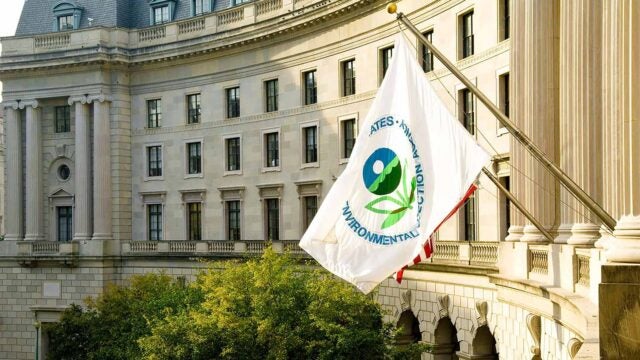- Resources
- Credibility, predictability, and competitiveness: Why businesses support EPA’s greenhouse gas reporting program and oppose its rollback
Resources
Credibility, predictability, and competitiveness: Why businesses support EPA’s greenhouse gas reporting program and oppose its rollback
Published: November 20, 2025 by Sean Hackett
For more than 15 years, the Greenhouse Gas Reporting Program (GHGRP) has provided vital, transparent information on greenhouse gas emissions from large industrial facilities. This has provided important information for policymakers, transparency for communities, and has created a consistent, credible framework for businesses to report their emissions.
The comment period on EPA’s proposal to roll back the GHGRP recently closed and across stakeholders, the message was clear: companies, states and communities alike support the program and want it to be preserved. That support has also extended to Capitol Hill — in a rare show of bipartisan agreement, Senators Sheldon Whitehouse (D-R.I.) and Kevin Cramer (R-N.D.) jointly urged EPA to maintain the GHGRP.
From oil and gas producers to utilities, manufacturers, and financial institutions, stakeholders reaffirmed that credible, consistent emissions reporting is essential for sound investment, competitiveness, and accountability.
This widespread showing of support builds on a broader trend: over recent months, leading businesses and trade associations have also expressed support for EPA’s Endangerment Finding and motor vehicle greenhouse gas standards, along with serious concerns about the administration’s proposal to repeal them. This all reinforces the broad-based benefits these programs confer, including providing a stable and predictable regulatory environment grounded in rigorous science and transparency.
The GHGRP provides rigorous, transparent data
For over 15 years, the GHGRP has been the backbone of U.S. emissions transparency, covering more than 8,000 facilities across 47 sectors. EDF’s comments underscore how the GHGRP is foundational to our nation’s ability to effectively address climate change, providing transparent, reliable, and comprehensive data on climate pollution across major economic sectors. Its repeal would undermine decades of progress, erode public trust, harm American competitiveness, and jeopardize our ability to confront the climate crisis. For businesses, the GHGRP underpins investor confidence, risk disclosure, federal tax credits, and life-cycle analysis — and it plays a growing role in maintaining market access and credibility for U.S. exports in the EU, Japan, and South Korea, where verified emissions data are fast becoming a prerequisite for trade.
EPA’s proposal to eliminate the program wouldn’t end emissions reporting. It would just make it more fragmented, more expensive, and less credible — jeopardizing access to federal incentives like the 45Q carbon capture credit, weakening investor trust, and undermining the competitiveness of U.S. products abroad.
Businesses have spoken — What comes next?
Businesses have made a strong case for keeping the GHGRP intact.
In public comments, the American Petroleum Institute (API) emphasized that: “Halting or curtailing the EPA’s collection of GHGRP data from the U.S. oil and natural gas industry may leave U.S. companies ill equipped to meet the demand for comparable and robust information.” They added that “[m]aintaining the GHGRP is essential to advancing innovative industries, providing a credible framework for claiming 45Q, 45V, and 45Z tax credits, and ensuring the United States continues its role as the world’s energy innovator.”
That message was echoed forcefully in joint comments submitted by a coalition of 20 major industry groups — from the U.S. Chamber of Commerce and Airlines for America to the American Gas Association, Edison Electric Institute, Renewable Fuels Association, and Western Energy Alliance. The coalition wrote that the GHGRP “serves important market, regulatory, and competitiveness functions for American business,” helping U.S. companies “satisfy various regulatory obligations, demonstrate equivalency with international trade policies, support emerging domestic industries, and provide a source of credible data.”
In urging EPA to preserve the program, the coalition warned that eliminating it “could disrupt these functions and create new challenges and costs for many U.S. businesses.”
According to American Exploration & Production Council (AXPC): “A stable federal GHG reporting program is beneficial for regulatory certainty and efficiency across the upstream oil and gas sector… The federal baseline also provides the necessary foundation for EPA to evaluate emerging technologies or incorporate alternative methodologies, avoiding reliance on more prescriptive and less efficient approaches.”
The Business Roundtable, representing America’s leading companies across sectors, reinforced that message — underscoring how GHGRP data underpins not just environmental accountability but U.S. competitiveness in global markets:
“Credible and verified GHGRP data is vital for U.S. competitiveness in global markets, especially with the European Union’s carbon border adjustment mechanism (CBAM), low carbon fuel and methane regulations. Without federally verified GHGRP data, U.S. exporters may face default emissions penalties, higher compliance costs and loss of market access.”
Similarly, the National Association of Manufacturers echoed that message, noting:
“The GHGRP provides a consistent, national baseline for greenhouse gas reporting that enables comparability across sectors and supports both regulatory and voluntary efforts to reduce emissions. Eliminating this program would create uncertainty and fragmentation, increasing costs for manufacturers and complicating compliance across state and international jurisdictions.”
SEMI, which represents more than 675 members across the U.S. semiconductor industry, emphasized that their members rely on the GHGRP for compliance, benchmarking, and credibility, and warned that repealing it “would increase costs and weaken U.S. competitiveness in a sector critical to national security and economic leadership.”
Taken together, these comments echo the same themes voiced in support of other EPA policies: the importance of certainty, transparent and credible data, and stable, rational, science-based policy. Across the economy, industry is calling for durable regulatory frameworks that support investment, innovation, and U.S. competitiveness.
Looking Ahead
Uncertainty is bad for business. Policy whiplash creates chaos. It makes it harder to plan long-term, harder to deploy new technologies, and harder to justify investments in continuous improvement.
Companies across the U.S. are showing that transparency and efficiency go hand in hand. Robust emissions reporting serves environmental goals while also strengthening operational performance, improving access to capital, and reinforcing America’s position as a global leader in responsible energy production.
This widespread support for the GHGRP shows that credible data and stable, predictable policy can unite a broad range of interests around shared goals. That consensus is a foundation we can build on to cut harmful pollution and keep American industry competitive, innovative, and trusted around the world.

-
Climate Policy NewsletterSign up for updates




